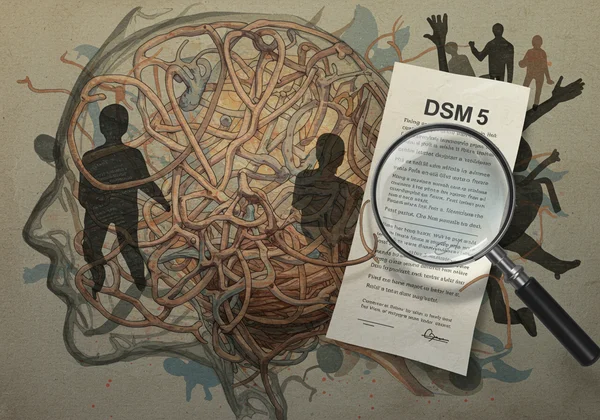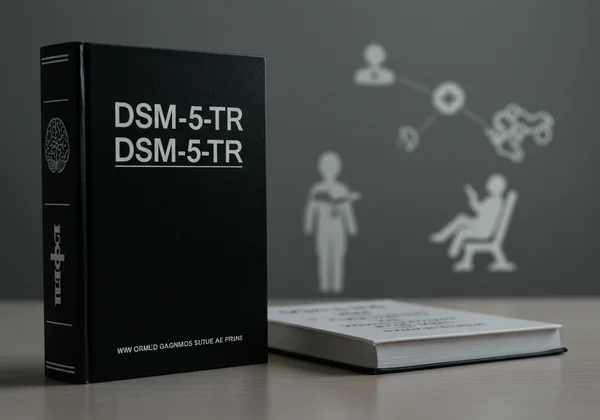What Are the 9 Official DSM-5 Criteria for Narcissistic Personality Disorder (NPD)?
October 27, 2025 | By Clara Jennings
Navigating the complex world of personality is challenging, especially with a term as widely used—and often misunderstood—as "narcissism." While it's easy to label someone who takes a lot of selfies as a narcissist, the clinical definition is far more specific. This article demystifies the 9 official DSM-5 criteria for Narcissistic Personality Disorder (NPD), the diagnostic standard established in the Diagnostic and Statistical Manual of Mental Disorders and used by mental health professionals worldwide.
Understanding these criteria is the first step toward genuine insight, whether you're reflecting on your own behaviors or trying to comprehend those of someone else. This framework, based on decades of clinical research, helps identify patterns that cause significant distress. For a confidential starting point, a well-structured narcissistic personality disorder test can offer preliminary insights based on these official traits.
Key Takeaways
Official Framework: The 9 DSM-5 criteria are the gold standard used by clinicians for diagnosing NPD.
Diagnosis Threshold: A person must exhibit a persistent pattern of at least five of the nine criteria for a potential NPD diagnosis.
Traits vs. Disorder: Having some narcissistic traits is not the same as having NPD, which is a pervasive and impairing condition.
No Self-Diagnosis: This guide is for educational purposes only; a formal diagnosis requires a qualified mental health professional.

Understanding Narcissistic Personality Disorder (NPD) Beyond the Stereotypes
Before diving into the list of traits, it's essential to understand what Narcissistic Personality Disorder truly is. It's not just vanity or selfishness; it is a complex mental health condition characterized by a pervasive pattern of grandiosity, a constant need for admiration, and a lack of empathy for others.
What Distinguishes NPD from Everyday Narcissism?
Everyday narcissism might involve a person being overly proud of an accomplishment or occasionally self-centered. In contrast, NPD is a deeply ingrained and persistent personality disorder that negatively impacts nearly every aspect of an individual's life, from personal relationships to their professional career. It’s the difference between temporary confidence and a grandiose sense of self that is fragile and requires constant external validation.
The DSM-5-TR: The Clinical Standard for Diagnosis
The Diagnostic and Statistical Manual of Mental Disorders, Fifth Edition, Text Revision (DSM-5-TR), is the authoritative guide used by clinicians to diagnose mental health disorders. Its criteria for NPD are based on extensive research and clinical observation. Relying on these standards ensures that our understanding is based on scientific consensus, not pop psychology, which is why the online screening tool on our site is built upon this very framework.

The 9 Diagnostic Criteria for NPD (Explained)
For a clinical diagnosis of NPD, an individual must exhibit a consistent pattern of at least five of the following nine criteria. These traits typically begin by early adulthood and are present in a variety of contexts.
1. Grandiose Sense of Self-Importance
This is more than just high self-esteem. It involves an unrealistic and inflated sense of one's own importance. An individual with this trait may exaggerate their achievements and talents, expecting to be recognized as superior without commensurate accomplishments. For example, they might consistently refer to themselves as the 'key player' in a group project, even if their contribution was minor, and expect praise for it.
2. Preoccupation with Fantasies of Unlimited Success, Power, Brilliance, Beauty, or Ideal Love
Individuals exhibiting this trait often live in a fantasy world that supports their delusions of grandeur. They may be fixated on achieving immense power or influence, finding the perfect, idealized partner, or being recognized for a brilliance they believe they possess. For instance, they might constantly talk about the multi-million dollar company they will launch, dismissing their current, modest job as a temporary inconvenience for a person of their destiny.
3. Belief in Being "Special" and Unique
This trait is rooted in a deep-seated belief that they are exceptionally unique and can only be truly understood by, or should associate with, other special or high-status people or institutions. An example is someone who refuses to see a highly-rated family doctor for a common illness, insisting they can only be treated by the "head of the department" at the most prestigious hospital.
4. Requires Excessive Admiration
While most people appreciate a compliment, someone with this trait has an insatiable hunger for attention and admiration. Their self-esteem is like a leaky tire, requiring constant inflation from others. A clear example is an individual who posts a photo on social media and becomes visibly upset or angry if it doesn't receive a steady stream of likes and adoring comments.

5. Sense of Entitlement
A sense of entitlement is the unreasonable expectation of especially favorable treatment or automatic compliance with their expectations. They might believe they shouldn't have to wait in line, that they deserve special privileges, or that others should bend over backward to meet their needs. For example, becoming furious at a restaurant for not having a table immediately available, despite having no reservation, believing their presence alone should warrant priority.
6. Interpersonally Exploitative Behavior
This trait involves taking advantage of others to achieve one's own ends. The individual may manipulate or use others without regard for their feelings or well-being. Relationships are often viewed transactionally. A classic example is befriending a coworker only to have them do most of their work, and then dropping the "friendship" once the project is over or the person is no longer useful.
7. Lacks Empathy
A profound lack of empathy is one of the most defining criteria of NPD. This is an inability or unwillingness to recognize, identify with, or care about the feelings and needs of others. For instance, if a friend is crying over the loss of a beloved pet, the individual might impatiently interrupt to talk about a minor accomplishment they had at work that day.
8. Often Envious of Others or Believes Others are Envious of Them
This trait works in two ways. The individual may be intensely envious of others' successes, believing they are more deserving. Conversely, they may hold a strong belief that others are envious of them. An example is devaluing a friend's career promotion with comments like, "Well, anyone could have gotten that job," while also believing that same friend is secretly jealous of their "superior" intellect.
9. Arrogant, Haughty Behaviors or Attitudes
This criterion manifests as a patronizing, snobbish, or disdainful attitude, which is often a defense mechanism for deep-seated insecurities. They might scoff at others' opinions or carry themselves with an air of superiority. A common example is treating service staff, like a waiter or cashier, with condescension and contempt, as if they are beneath them.
Understanding Your Observations: Traits vs. Diagnosis
Recognizing these traits in yourself or someone else can be unsettling, but it's vital to approach this information responsibly. Observing one or two of these characteristics in someone does not mean they have NPD.
Distinguishing Traits from a Clinical Diagnosis
A formal clinical diagnosis of NPD can only be made by a qualified mental health professional, such as a psychiatrist or psychologist. The diagnosis requires that at least five of the criteria are met and that these traits are inflexible, persistent, and lead to significant functional impairment or subjective distress. Many people may have narcissistic traits, but that is very different from having a full-blown personality disorder.
When to Seek Further Insight or Professional Guidance
If you read through this list and found that many of the criteria resonate strongly with your own experiences or your observations of a loved one, it may be a sign to seek more clarity. The first step doesn't have to be a clinical appointment. An anonymous, evidence-based screening tool can provide a valuable starting point. To explore these traits further in a private setting, our test can offer preliminary insights.

Your Next Steps to Clarity
Understanding the nine official DSM-5 criteria for NPD is a powerful tool for clarity, not a weapon for labeling. It moves the conversation from vague accusations to specific, observable behaviors, which can help you make sense of confusing relationship dynamics or begin a journey of self-awareness.
Remember, this information is for educational purposes and is not a substitute for a professional evaluation. If these patterns feel deeply familiar, the most empowering action is to seek further insight. Take the first step toward clarity with our free, confidential narcissistic personality disorder test.
Frequently Asked Questions About NPD Traits and Diagnosis
What are the 9 signs of NPD according to the DSM-5?
The nine official DSM-5 criteria are: 1) a grandiose sense of self-importance, 2) preoccupation with fantasies of success, 3) belief in being "special," 4) need for excessive admiration, 5) sense of entitlement, 6) interpersonal exploitation, 7) lack of empathy, 8) envy of others, and 9) arrogant, haughty behaviors. A clinical diagnosis requires a persistent pattern of at least five.
How can I tell if someone has narcissistic traits?
You can look for consistent patterns of behavior that align with the nine official criteria described in this article. However, observing traits is different from diagnosing. For personal insight, a confidential screening tool can be a helpful, non-diagnostic first step. Our free NPD test is designed for this purpose.
Can these criteria be used for self-diagnosis of NPD?
No. These criteria are for educational and informational purposes only. A proper diagnosis of NPD can only be made by a licensed mental health professional after a comprehensive psychological evaluation. Self-diagnosis or diagnosing others is unreliable and can be harmful.
How do these criteria relate to an "official NPD test"?
An official NPD test or screening tool, like the one on our website, is developed using questions that measure the underlying behaviors and attitudes of the nine DSM-5 criteria. While it cannot provide a diagnosis, it scores responses to show the degree to which you may exhibit traits associated with NPD, offering a valuable starting point for self-reflection or discussion with a professional.
Can I diagnose my partner with NPD?
No, you cannot diagnose your partner, or anyone else, with NPD. Diagnosis is a complex process that must be performed by a qualified clinician. If you recognize these traits in your partner and they are causing distress in your relationship, the most productive step is to seek therapy for yourself to develop coping strategies or to encourage your partner to seek a professional evaluation.